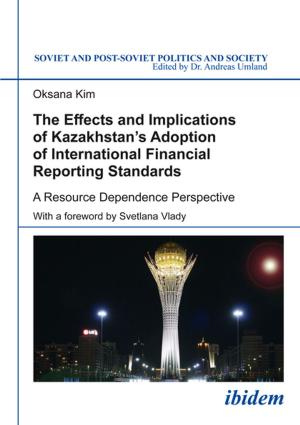| Author: | Dirk Matthias Dalberg, Leonid Luks, Ewelina Klimczak, Konstantin Kaminskij | ISBN: | 9783838271385 |
| Publisher: | ibidem | Publication: | July 20, 2017 |
| Imprint: | ibidem | Language: | English |
| Author: | Dirk Matthias Dalberg, Leonid Luks, Ewelina Klimczak, Konstantin Kaminskij |
| ISBN: | 9783838271385 |
| Publisher: | ibidem |
| Publication: | July 20, 2017 |
| Imprint: | ibidem |
| Language: | English |
The history of Soviet nonconformism and, more broadly, of East European dissent has been written as a history of ideas, the subject of which is the transfer, internalization, and the subversive force of liberal values in socialist societies. In this sense, the nonconformist subconscious of totalitarian systems was expressed in the universal discourse of human rights. When the Helsinki Accords (CSCE) were signed by the Soviet Union in 1975, the commitment made there to respect for human rights and fundamental freedoms became en-forceable. Since then, freedom of expression, religion, belief, and conscience became rights that were part of the basic vocabulary of the civil rights movements formed illegally within nonconformist groups and networks within the Eastern Bloc. However, the right to private property, which means something essential in the liberal system of values, seems to have played no role in the development of this nonconformist discourse, or its role was at least not considered until now by historians of ideas and of culture. In the present contribution, I would like to begin by addressing the failure to reflect on the relationship between private property and the consensus on liberal values. I will do so in order to show how the discourse of property rights penetrated the Soviet culture of nonconformism and within a short time brought about signifi-cant changes in the social and economic practices of Soviet institu-tions, thus accelerating their decline … . (Aus dem Beitrag von Konstantin Kaminskij)
The history of Soviet nonconformism and, more broadly, of East European dissent has been written as a history of ideas, the subject of which is the transfer, internalization, and the subversive force of liberal values in socialist societies. In this sense, the nonconformist subconscious of totalitarian systems was expressed in the universal discourse of human rights. When the Helsinki Accords (CSCE) were signed by the Soviet Union in 1975, the commitment made there to respect for human rights and fundamental freedoms became en-forceable. Since then, freedom of expression, religion, belief, and conscience became rights that were part of the basic vocabulary of the civil rights movements formed illegally within nonconformist groups and networks within the Eastern Bloc. However, the right to private property, which means something essential in the liberal system of values, seems to have played no role in the development of this nonconformist discourse, or its role was at least not considered until now by historians of ideas and of culture. In the present contribution, I would like to begin by addressing the failure to reflect on the relationship between private property and the consensus on liberal values. I will do so in order to show how the discourse of property rights penetrated the Soviet culture of nonconformism and within a short time brought about signifi-cant changes in the social and economic practices of Soviet institu-tions, thus accelerating their decline … . (Aus dem Beitrag von Konstantin Kaminskij)















